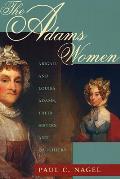The Last Years of Parson Wibird
To answer yesterday’s question, the Rev. Anthony Wibird, minister of the north precinct of Braintree (which became Quincy) never married.
Even as he discussed marriage with the parson as another young man attracted to Hannah Quincy, John Adams may have sensed that Wibird wasn’t really that interested in marrying. He wrote that the parson showed a “dronish effiminacy,” which seems like a sort of queerness, though whether it’s asexuality or homosexuality Adams didn’t clarify—or maybe didn’t understand.
Adams felt that Wibird was waiting for a woman to ”conquer him and rouse his spirit.” None did. As a minister with a salary of £100 a year, Wibird could offer social and economic status. Perhaps the physical disabilties Adams described as quoted here (or the physiognomic oddities Adams also described but I didn’t quote) turned women off. But other men with greater disabilities and less social status got married, and Parson Wibird never did.
As a result, according to Paul Nagel in The Adams Women, the community duties that a minister’s wife usually performed fell to Mary Cranch. She and her husband Richard became organizers of the congregation while her younger sister Abigail spent more and more years away from Braintree with her husband John, and her baby sister Betsy married a minister in Haverhill.
By the late 1780s, Parson Wibird’s infirmities became more pronounced. People noticed that he wasn’t keeping his house or his clothing clean. In 1787 Mary Cranch wrote of “that vile house,” and said, “if it was in Boston the Select men would pull it down.”
Wibird had always repeated sermons, but now that habit got worse, and he missed dates. In the 1790s, there was a multi-year effort to hire an assistant minister to make up for Wibird’s declining abilities and ease him out.
Congregants worried about how Wibird would take that, but he dutifully attended his young colleague’s ordination in early 1800. Then people noticed he kept wearing the same shirt for six weeks. Like his house, it became infested with vermin. Finally, Mary Cranch assembled a committee of male neighbors and marched in.
They bathed Wibird, rubbed salve on his insect bites, packed some belongings, and took him, partly by force, to a neighbor’s house to live. There the septuagenarian parson read books and chatted with visitors for a couple more months before dying.
(In the twenty years since Nagel wrote The Adams Women, the Adams Family Correspondence volumes have caught up to the letters that he quoted from microfilm, but the volume covering the minister’s bath is still not available digitally.)
COMING UP: Hannah Quincy and her husband.
Even as he discussed marriage with the parson as another young man attracted to Hannah Quincy, John Adams may have sensed that Wibird wasn’t really that interested in marrying. He wrote that the parson showed a “dronish effiminacy,” which seems like a sort of queerness, though whether it’s asexuality or homosexuality Adams didn’t clarify—or maybe didn’t understand.
Adams felt that Wibird was waiting for a woman to ”conquer him and rouse his spirit.” None did. As a minister with a salary of £100 a year, Wibird could offer social and economic status. Perhaps the physical disabilties Adams described as quoted here (or the physiognomic oddities Adams also described but I didn’t quote) turned women off. But other men with greater disabilities and less social status got married, and Parson Wibird never did.
As a result, according to Paul Nagel in The Adams Women, the community duties that a minister’s wife usually performed fell to Mary Cranch. She and her husband Richard became organizers of the congregation while her younger sister Abigail spent more and more years away from Braintree with her husband John, and her baby sister Betsy married a minister in Haverhill.
By the late 1780s, Parson Wibird’s infirmities became more pronounced. People noticed that he wasn’t keeping his house or his clothing clean. In 1787 Mary Cranch wrote of “that vile house,” and said, “if it was in Boston the Select men would pull it down.”
Wibird had always repeated sermons, but now that habit got worse, and he missed dates. In the 1790s, there was a multi-year effort to hire an assistant minister to make up for Wibird’s declining abilities and ease him out.
Congregants worried about how Wibird would take that, but he dutifully attended his young colleague’s ordination in early 1800. Then people noticed he kept wearing the same shirt for six weeks. Like his house, it became infested with vermin. Finally, Mary Cranch assembled a committee of male neighbors and marched in.
They bathed Wibird, rubbed salve on his insect bites, packed some belongings, and took him, partly by force, to a neighbor’s house to live. There the septuagenarian parson read books and chatted with visitors for a couple more months before dying.
(In the twenty years since Nagel wrote The Adams Women, the Adams Family Correspondence volumes have caught up to the letters that he quoted from microfilm, but the volume covering the minister’s bath is still not available digitally.)
COMING UP: Hannah Quincy and her husband.


1 comment:
Really a sad story, although the Parson himself didn't himself seem too bothered by his "disabilities" at least in your recounting of his life...
I was wondering about his odd surname--did he come from a Germanic or Scandinavian background? "Wibird" is a name I've certainly never encountered during this period...
Post a Comment